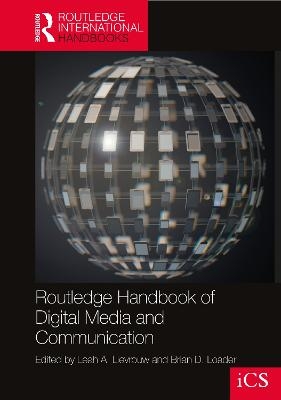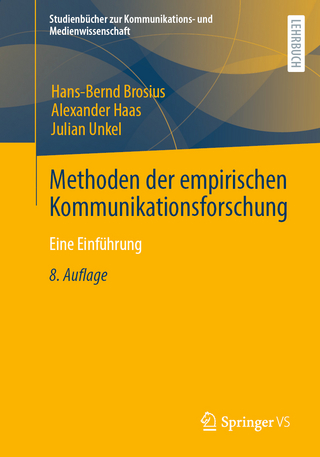
Routledge Handbook of Digital Media and Communication
Routledge (Verlag)
978-1-138-67209-3 (ISBN)
What are we to make of our digital social lives and the forces that shape it? Should we feel fortunate to experience such networked connectivity? Are we privileged to have access to unimaginable amounts of information? Is it easier to work in a digital global economy? Or is our privacy and freedom under threat from digital surveillance? Our security and welfare being put at risk? Our politics undermined by hidden algorithms and misinformation? Written by a distinguished group of leading scholars from around the world, the Routledge Handbook of Digital Media and Communication provides a comprehensive, unique, and multidisciplinary exploration of this rapidly growing and vibrant field of study. The Handbook adopts a three-part structural framework for understanding the sociocultural impact of digital media: the artifacts or physical devices and systems that people use to communicate; the communicative practices in which they engage to use those devices, express themselves, and share meaning; and the organizational and institutional arrangements, structures, or formations that develop around those practices and artifacts. Comprising a series of essay-chapters on a wide range of topics, this volume crystallizes current knowledge, provides historical context, and critically articulates the challenges and implications of the emerging dominance of the network and normalization of digitally mediated relations. Issues explored include the power of algorithms, digital currency, gaming culture, surveillance, social networking, and connective mobilization. More than a reference work, this Handbook delivers a comprehensive, authoritative overview of the state of new media scholarship and its most important future directions that will shape and animate current debates.
Leah A. Lievrouw is Professor of Information Studies at the University of California, Los Angeles. Her research focuses on the relationship between digital/new media technologies and social change. She is the author of Alternative and Activist New Media (Polity, 2011; second ed. in preparation) and editor of Challenging Communication Research (Peter Lang, for the International Communication Association, 2014). With Sonia Livingstone, she edited two editions of the Handbook of New Media (Sage, 2002, 2006). Her current works in progress include Foundations of Communication Theory: Communication and Technology (Wiley-Blackwell). Currently, she is also North American editor for the international journal Information, Communication & Society. Brian D. Loader is an honorary fellow in the Department of Sociology at the University of York, UK. His academic interests are focused around the social relations of power in a digitally mediated world, including social media and citizenship participation. More specifically, his research interests are primarily concerned with young citizens, civic engagement, and social media; social movements and digital democracy; and community informatics and the digital divide. He has written widely on these subjects for the past 25 years. He is the founding Editor in Chief of the international journal Information, Communication & Society.
Introduction PART I: ARTIFACTS 1. The Hearth of Darkness: Living within Occult Infrastructures 2. Mobile Media Artifacts: Genealogies, Haptic Visualities, and Speculative Gestures 3. Digital Embodiment and Financial Infrastructures 4. Ubiquity 5. Interfaces and Affordances 6. Hacking 7. (Big) Data and Algorithms: Looking for Meaningful Patterns 8. Archive Fever Revisited: Algorithmic Archons and the Ordering of Social Media PART II: PRACTICES 9. The Practice of Identity: Development, Expression, Performance, Form 10. Our Digital Social Life 11. Digital Literacies in a Wireless World 12. Family Practices and Digital Technology 13. Youth, Algorithms and the Problem of Political Data 14. What Remains of Digital Democracy? Contemporary Political Cleavages and Democratic Practices 15. Journalism’s Digital Publics: Researching the ‘Visual Citizen’ 16. News Curation, War and Conflict 17. Information, Technology, and Work: Proletarianization, Precarity, Piecework 18. Automated Surveillance PART III: ARRANGEMENTS 19. Deep Mediatization: Media Institutions’ Changing Relations to the Social 20. Fluid Hybridity: Organizational Form and Formlessness in the Digital Age 21. All the Lonely People? The Continuing Lament about the Loss of Community 22. Distracted by Technologies and Captured by the Public Sphere 23. Social Movements, Communication and Media 24. Governance and Regulation 25. Property and the Construction of the Information Economy: A Neo-Polanyian Ontology 26. Globalization and Post-Globalization 27. Toward A Sustainable Information Society: A Global Political Economy Perspective
| Erscheinungsdatum | 08.01.2018 |
|---|---|
| Reihe/Serie | Routledge International Handbooks |
| Zusatzinfo | 4 Line drawings, black and white; 3 Halftones, black and white; 7 Illustrations, black and white |
| Verlagsort | London |
| Sprache | englisch |
| Maße | 174 x 246 mm |
| Gewicht | 453 g |
| Themenwelt | Sozialwissenschaften ► Kommunikation / Medien ► Kommunikationswissenschaft |
| Sozialwissenschaften ► Kommunikation / Medien ► Medienwissenschaft | |
| Sozialwissenschaften ► Soziologie | |
| ISBN-10 | 1-138-67209-2 / 1138672092 |
| ISBN-13 | 978-1-138-67209-3 / 9781138672093 |
| Zustand | Neuware |
| Haben Sie eine Frage zum Produkt? |
aus dem Bereich


